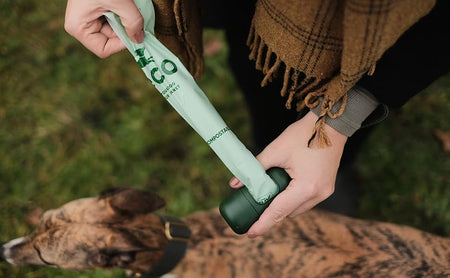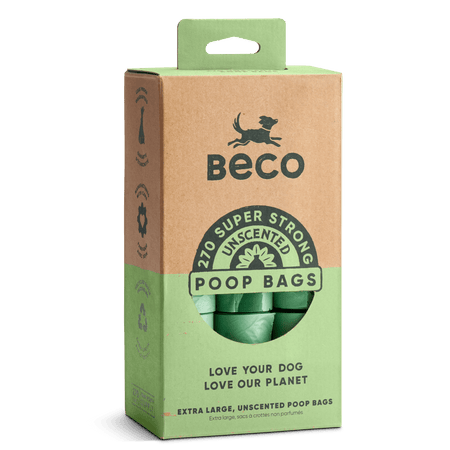Picking up after our dogs is part of daily life.
But the bags we use to do it can carry a heavier environmental cost than many realise.
The rise of biodegradable dog poop bags has offered a more responsible alternative to conventional plastic, but not all "green" bags live up to their claims.
And in many cases, they may not be as environmentally sound as they seem.
We’ll unpack what biodegradable really means, how these bags compare to other so-called “eco options,” and why we at Beco ultimately chose recycled materials instead.
- Stress and anxiety in unfamiliar environments trigger physiological gut responses.
- Dogs don't automatically apply house training rules to new locations.
- Scent marking from other pets can confuse visiting dogs.
- Supervised visits with consistent routines prevent most accidents.
What Are Biodegradable Dog Poop Bags?
At first glance, biodegradable bags seem like a clear win. But the term “biodegradable” is often used loosely.
Technically, it refers to materials that break down naturally over time into water, carbon dioxide, and biomass. The problem is that process only works under the right environmental conditions – heat, moisture, oxygen, and the presence of microbes.
In a home composting system, for instance, some biodegradable bags can break down within 3–12 months.
But if they end up in a landfill or the ocean (where there’s very little oxygen), they can sit for years, releasing methane or fragmenting into microplastics, much like conventional plastics.
Biodegradable vs Compostable Poop Bags
The terms biodegradable and compostable are often used interchangeably, but they’re not the same:

This distinction matters because not all biodegradable bags are compostable, and even many compostable ones require industrial composting to break down properly, which is not widely accessible, especially for dog waste.
Can You Compost Dog Poop?
Technically, yes.
But there’s a caveat. Dog waste can carry pathogens like E. coli and salmonella, which means it shouldn't be composted in the same bin as kitchen scraps or used on edible plants.
For safe composting, it needs to go into a dedicated compost system for pet waste, separate from your garden compost.
In the UK, there’s currently no widespread infrastructure to collect and industrially compost dog waste. This makes proper disposal more complicated – many well-intentioned bags end up in general waste, where they lose most of their environmental benefit.
Environmental Pros and Cons of Biodegradable Bags
Let’s take a closer look at how biodegradable bags stack up:
Potential Benefits
-
Less reliance on virgin plastics: Using plant-based or biodegradable materials reduces dependence on fossil fuels.
-
Reduced risk to wildlife: Unlike traditional plastic, these bags break down faster and don’t produce microplastics (if composted correctly).
-
Non-toxic breakdown: Certified compostable bags degrade into organic matter, not synthetic fragments.
Key Limitations
-
Require specific composting conditions: Most biodegradable bags won’t break down properly in landfill, the ocean, or even cold, dry environments.
-
Can still cause methane emissions: If they break down anaerobically (without oxygen), they can release methane – a potent greenhouse gas.
-
Greenwashing and confusion: Labels like “biodegradable” or “eco” often go unchecked, leading to misleading marketing and consumer assumptions.
-
Inconsistent performance: Some biodegradable bags are thinner or prone to tearing, though newer versions are improving.
Biodegradable vs Recycled Plastic: Which Is Better?
When comparing biodegradable and recycled options, it’s important to consider not just the material itself, but what happens after it’s used.
Biodegradable and compostable bags rely on specific disposal conditions (typically industrial composting) to break down as intended.
But in reality, most areas don’t have accessible composting systems for dog waste. As a result, many of these bags end up in landfill, where they may not decompose properly and can still contribute to methane emissions or microplastic pollution.
Recycled plastic, on the other hand, works within the waste systems we already have. By using post-consumer recycled materials, we can reduce reliance on virgin plastic and help divert existing plastic from the environment without depending on infrastructure that doesn’t yet exist at scale.
That’s why we chose this route:
-
♻️ It keeps existing plastic out of landfill and oceans
-
🛠 It works with current waste infrastructure (no composting needed)
-
🐶 It’s strong, leak-resistant, and reliable for daily use
Frequently Asked Questions
Can I flush biodegradable dog poop bags down the toilet?
No, even biodegradable bags are not designed to be flushed. Doing so can damage plumbing and wastewater systems. Always dispose of bags in general waste unless a dedicated composting option is available.
Do biodegradable poop bags expire?
Yes, most have a shelf life of 9–12 months. Exposure to heat, humidity, or direct sunlight can cause them to weaken or start breaking down before use, so store them in a cool, dry place.
Are biodegradable bags safe for use in parks or public bins?
They’re safe to use, but their environmental benefit depends on disposal. If the waste ends up in landfill (which most public bins feed into), the bag may not break down as intended.
Is using newspaper or no bag at all a better option?
In theory, reusing newspaper or using no bag creates less plastic waste. But in practice, these methods are often messier and less hygienic. A recycled plastic bag offers a cleaner, more scalable middle ground.
Conclusion
Biodegradable dog poop bags can be part of a lower-impact routine, but only when they’re disposed of correctly.
Without access to composting infrastructure, many end up in landfills, where they behave much like conventional plastic.
That’s why we chose to use post-consumer recycled plastic instead. It works within existing systems, helps divert waste, and still delivers strength and reliability when it matters most.
If you're looking to make a more practical, responsible swap, shop our poop bags. Because even something as simple as a poop bag can be a step towards better choices – for your pet, and for the planet.










